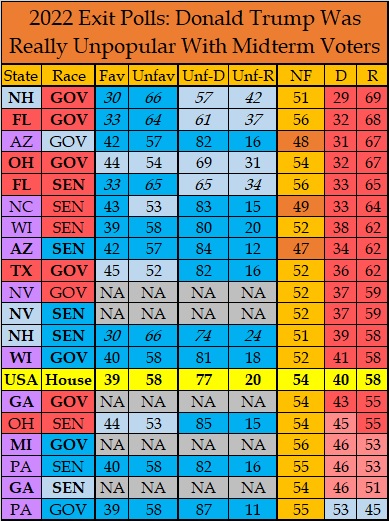(National Review) Donald Trump announced his 2024 presidential campaign Tuesday night, heavy with the odor of a man fighting the last war. But politics is all about matching the man to the moment. Trump’s moment was six years ago. The nation’s voters have moved on, and if early signs are any indication, Republican primary voters are ready to consider doing so as well.
The 2022 midterms were about as decisive a failure for Trump as it was possible for them to be. Consider, as one item of evidence, the exit polls. Exit polls are not perfect; even though they should have the advantage over other polls of polling only people who actually voted, they still have their known biases and shortcomings. Still, they are the only evidence we get of who voted for whom and why at the time of the actual election, and when they deliver messages in bold, screaming letters, we should listen.
The 2022 exit polls examined the national House electorate and 19 Senate and/or governors races across eleven states — Arizona, Florida, Georgia, Michigan, Nevada, New Hampshire, North Carolina, Ohio, Pennsylvania, Texas, and Wisconsin. Two of the clearest findings across all of these races are that (1) Donald Trump is profoundly unpopular with the people who voted in 2022 and (2) Trump was a fatal drag on many Republican candidates.

On the first point, look at Trump’s favorability ratings. He is viewed unfavorably by a solid majority of the midterm voters nationally (by a 19-point margin of 58 percent to 39 percent), and in every state polled, even places such as Texas (52 percent disapproval to 45 percent approval), Ohio (53 percent to 44 percent), and North Carolina (53 percent to 43 percent) that he won two years ago. In Florida and New Hampshire, the polls asked a different question — whether voters wanted Trump to run again — and the results were, if anything, more lopsided. (Granted, in Florida, some Ron DeSantis voters may like Trump but want the man of the hour to run in his place). And across the board, the voters who viewed Trump unfavorably voted in vast margins for the Democratic candidates. Outside of Florida and New Hampshire, Mike DeWine in Ohio was the only one of these candidates to get more than 20 percent of the vote from people with an unfavorable view of Trump (DeWine still lost those voters 69 percent to 31 percent).
For a Trump presidential campaign, these are terrible numbers. Trump’s hope is that winning the nomination would force lots of people to a choice between him and Joe Biden. But Republican primary voters don’t need to pick a candidate who is already disliked by a majority of the voters in Texas and Ohio and nearly 20 points underwater in Pennsylvania, Wisconsin, and Arizona.
How much of a drag was Trump’s unpopularity on Republican midterm candidates? The natural dynamic of midterms — the reason why we so often see them benefit the party out of power — is that the elections are about the president, who is frequently unpopular at that juncture (as is true of Joe Biden). Yet, the exit polls asked whether voters were voting to support or oppose Trump — and close to half said that they were. Republicans got massacred with those voters, denying them what might otherwise have been a historic landslide. In the generic House vote, for example, Joe Biden was quite unpopular (56 percent disapproval to 41 percent approval), although not quite as unpopular as Trump. At first glance, it might seem that Biden was the bigger problem. Democrats got just 14 percent of the voters who disapproved of Biden, while Republicans got 20 percent of the voters who disapproved of Trump. Among voters who disapproved of both men, Republicans won 57 percent to 40 percent. But normally, a midterm wouldn’t involve a competing unpopular figure from the other party.






